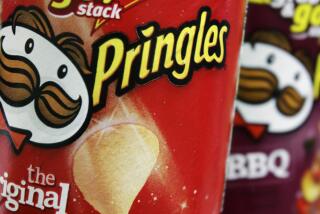Global giant Nestle to buy baby food maker Gerber
- Share via
The world’s largest food and beverage company turned its attention to the younger set Thursday. Nestle agreed to pay $5.5 billion in cash for Gerber Products Co., which has 80% of the U.S. baby food market.
Parsippany, N.J.-based Gerber, best known to parents for the charcoal drawing of a wide-eyed, chubby-cheeked infant on its products since 1931, is a unit of Novartis, another Swiss giant, which is focusing on healthcare and pharmaceuticals.
Nestle, which also owns Nescafe instant coffee, Perrier water and Dreyer’s ice cream, is a major producer of infant nutritional products worldwide but had long sought a role in the U.S. baby food market.
“The acquisition of Gerber is the perfect complementary fit,” Nestle Chief Executive Peter Brabeck-Letmathe said. “It not only gives Nestle the leadership position in baby food, but it also constitutes a decisive step to establish Nestle Nutrition as the undisputed global leader in the nutrition field.”
Last year was particularly acquisitive for Nestle, which began in 1866 with a pharmacist’s solution for babies unable to breast-feed.
Nestle in 2006 spent $600 million to buy Jenny Craig Inc., actress Kirstie Alley’s weight-loss solution. It spent $2.5 billion to add Novartis Medical Nutrition, which makes OptiFast weight-loss drinks and Boost nutritional supplements.
It also gained full ownership of Dreyer’s Grand Ice Cream Holdings, a deal that followed its protracted 2003 purchase of 67% of Oakland-based Dreyer’s Ice Cream.
Nestle had been the subject of a worldwide boycott starting in the late 1970s over the marketing of its infant formula.
The company, based in Vevey, Switzerland, employs about 260,000 people worldwide. Nestle USA, headquartered in Glendale, has 52 manufacturing facilities, six distribution centers and sales offices across the country.
Nestle’s revenue in 2006 totaled $81 billion, with a profit of $7.4 billion.
Sales of baby food in the U.S. have been flat for the last few years, according to research firm Mintel International Group’s “Baby Food and Drink” report issued in October. But the Gerber deal got high marks from industry analysts nonetheless.
“It’s a very smart move for Nestle,” said Lynn Dornblaser of Mintel Custom Solutions, the consumer research division of Mintel International. “It seems to be very sensible on two fronts. It allows them to get into baby food in the U.S. in a very big way and it bolsters their nutrition focus.”
Nestle also has the capacity to bring new products and innovation to the U.S. baby food market, drawing upon the expertise its gained in other countries, Dornblaser said.
The U.S. is behind Europe when it comes to organic offerings, she said. What’s more, simple things like new flavors could energize the baby food market: In Finland, a Nestle fruit puree baby food is made from a blend of peach and passion fruit.
“Nestle, like Unilever and also like Kraft, is in almost every category,” Dornblaser said. “I don’t know if that’s a bad thing. Its certainly something to watch because it gives them a lot of power and strength if they use it properly.”
More to Read
Inside the business of entertainment
The Wide Shot brings you news, analysis and insights on everything from streaming wars to production — and what it all means for the future.
You may occasionally receive promotional content from the Los Angeles Times.








